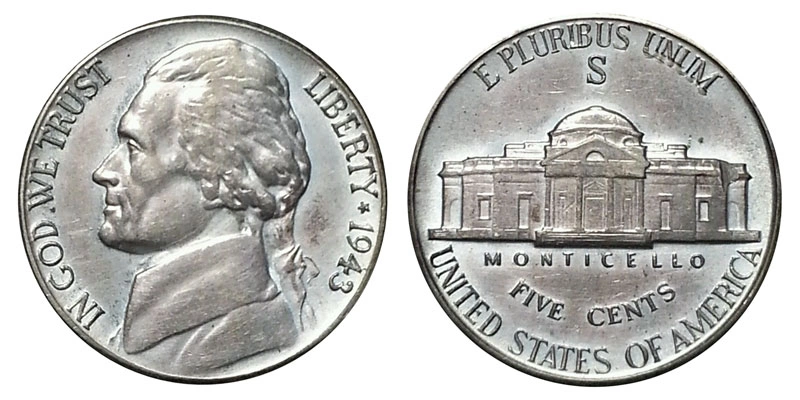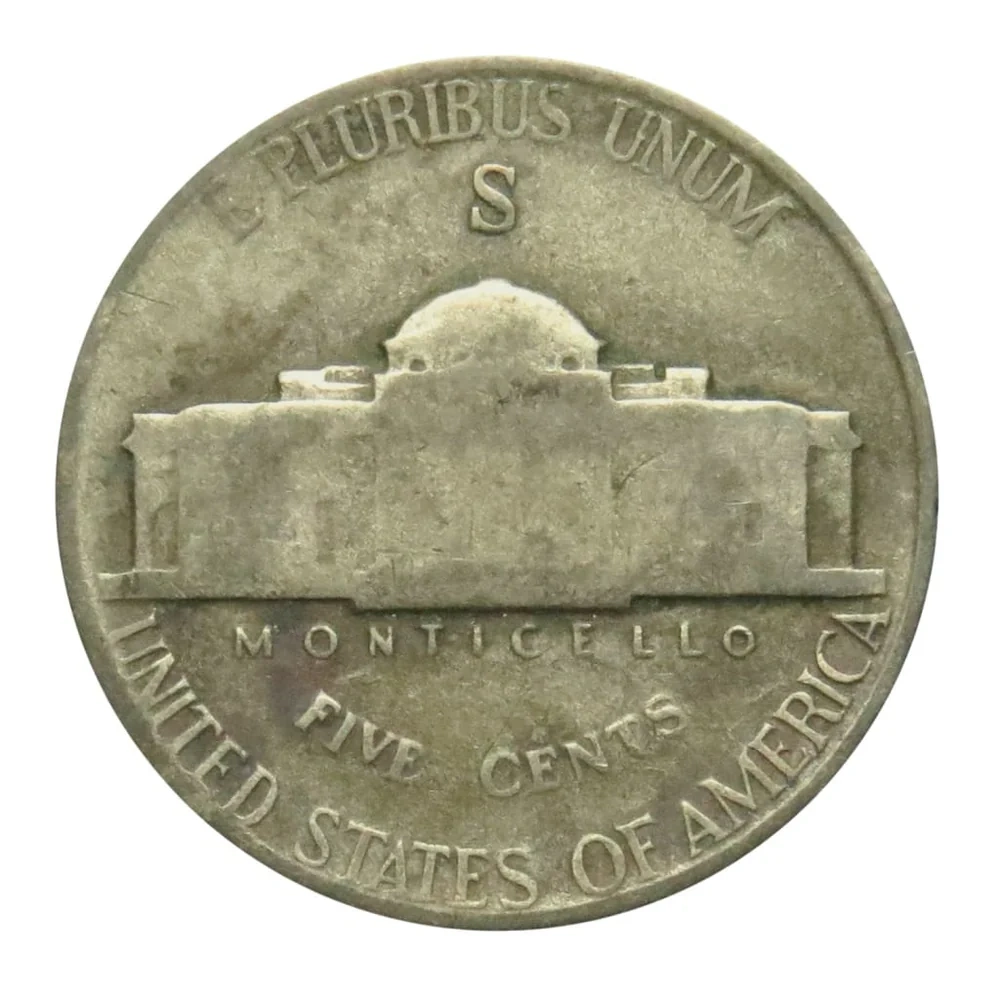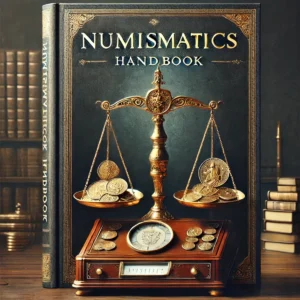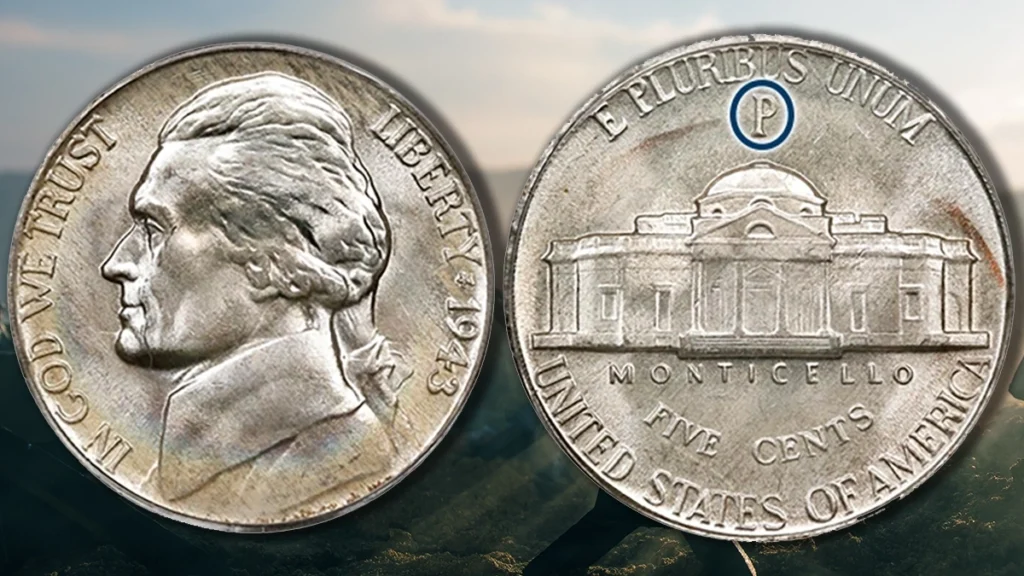Silver War Nickels (1942–1945): Value, Key Dates, Errors & 35% Silver Content
Uncover the unique history, precious metal content, and growing collector demand behind U.S. wartime nickels — the only nickels ever struck in silver, produced between 1942 and 1945 to support the Allied war effort.

📘 Download the full guide: Numismatics Handbook — A +135-page expert resource on U.S. coin collecting.
Why Silver War Nickels Matter
From mid-1942 through 1945, the U.S. Mint altered the standard nickel composition to conserve nickel and copper for military use. The result was a temporary alloy made of 35% silver — creating an affordable, historic, and often overlooked way to stack precious metals.

Collectors and investors love Silver War Nickels for:
🪙 35% Silver Content — Rare for nickels, yet still highly liquid and stackable
📅 Short Mintage Window — Only 3.5 years of production
🔍 Bold Mintmarks — Large P, D, or S over Monticello — a unique feature for the Jefferson series
💰 Low-Cost Silver Entry Point — Often priced below traditional bullion per ounce
📦 WWII Significance — Tangible relics of American resilience and resourcefulness
Silver War Nickel Composition & Identification
- Years Minted: 1942 (partial), 1943, 1944, 1945
- Composition: 56% copper, 35% silver, 9% manganese
- Weight: 5.0 grams
- Silver Content: ~0.05626 troy ounces per coin
- Key Identifier: Large mintmark (P, D, or S) above Monticello — the only time this occurred on Jefferson nickels

✅ Note: Some 1942 nickels are standard (non-silver) — only those with a large mintmark above the dome contain silver.
Most Valuable Silver War Nickels
| Year | Mintmark | Est. Value | Key Feature |
|---|---|---|---|
| 1943-P | P | $1–$5 | Common; valuable 3-over-2 variety exists |
| 1942-P | P | $1–$8 | First year of wartime silver nickels |
| 1945-S | S | $1–$4 | Final silver issue |
| 1943/2-P | P | $25–$150+ | Rare overdate error |
| 1944-D | D | $1–$3 | Common wartime date |
✅ High-grade specimens in MS66–MS68 or with Full Steps designations command significantly higher premiums, especially with PCGS/NGC certification.
Top Silver War Nickel Errors to Watch For
🛠 Notable Errors:
- 1943/2-P Overdate — A dramatic, collectible overstrike
- Doubled Die Reverses — Look for strong doubling on “MONTICELLO” or “FIVE CENTS”
- Off-Center Strikes — Most desirable with visible date
- Planchet Flaws & Laminations — Rare, but valuable to error collectors
✅ Error Tip: Even minor errors certified by NGC or PCGS can multiply a coin’s value 3x–10x over typical market rates.

How to Value Silver War Nickels
To value a silver war nickel, follow this process:
- Spot Silver Price: Check current market value (e.g., $26/oz)
- Multiply by 0.056 (silver content per nickel): $26 × 0.056 = ~$1.46 melt value
- Factor in Condition: XF examples are worth slightly more; uncirculated coins with Full Steps = premium
- Check for Key Dates and Errors
- Certification: Coins graded by PCGS or NGC are easier to sell and often worth more
Where to Buy and Sell Silver War Nickels
| Platform | Best For |
|---|---|
| eBay | Small lots, error coins |
| Local Coin Shops | Fast, local trades at fair prices |
| Bullion Dealers | Selling in bulk by silver weight |
| GreatCollections / Heritage | Certified coins, rare errors |
| Coin Shows | Swaps, direct trades, and volume sales |
✅ GoldSilverStacks Tip: Always weigh your coins and verify mintmarks before purchasing in bulk.
How to Store Silver War Nickels
🏛️ Use Tubes — Standard nickel tubes fit 40 coins
🌡️ Climate-Controlled Storage — Keep dry and cool to prevent oxidation
🧤 Use Gloves for MS Coins — Preserve luster and grading potential
🧽 Never Clean Silver Nickels — Natural tarnish is better than polish damage

Silver War Nickels & Silver Stacking Strategy
Silver war nickels are a smart addition to a diversified silver stack. Here’s why:
- Fractional Flexibility — Ideal for $1–$10 silver transactions
- Lower Premiums — Often cheaper per ounce than silver rounds or bullion bars
- Historical Significance — Enjoy stacking coins with wartime history
- GSR Opportunity — Use during high Gold/Silver Ratio periods to accumulate ounces cheaply

✅ Stacking Tip: When premiums on traditional bullion rise, war nickels become a cost-effective way to boost your physical silver exposure.
What are Silver War Nickels?
Silver War Nickels are U.S. five-cent coins minted from mid-1942 to 1945 with a 35% silver composition. They were created during World War II to conserve nickel and copper for the war effort.
How much silver is in a War Nickel?
Each War Nickel contains approximately 0.05626 troy ounces of silver. A full roll of 40 nickels holds about 2.25 troy ounces of silver.
How can I tell if a War Nickel has silver?
Look for a large mintmark (P, D, or S) above the Monticello building on the reverse. Only nickels minted from 1942–1945 with this feature contain silver.
What years were Silver War Nickels made?
Silver War Nickels were minted from mid-1942 through 1945. Early 1942 nickels without the large mintmark are not silver.
Are Silver War Nickels valuable?
Yes. Their value depends on silver content, condition, and rarity. Common circulated coins sell for $1–$3, while errors like the 1943/2-P overdate can bring $25–$150+.
What is the 1943/2-P Silver War Nickel?
The 1943/2-P is an overdate error coin where the “2” from 1942 is faintly visible under the “3” in 1943. It is a highly collectible and valuable Silver War Nickel error.
Can I sell Silver War Nickels for melt value?
Yes. You can sell them to bullion dealers, coin shops, or online for their silver melt value, typically based on the current spot price of silver.
Are Silver War Nickels good for stacking silver?
Absolutely. They’re ideal for fractional silver stacking, often carry lower premiums than bullion, and add historical interest to your silver holdings.
Should I clean Silver War Nickels?
No. Cleaning silver nickels reduces their value, especially if they are uncirculated or contain errors. Always keep them in their natural state.
Where is the best place to buy or sell Silver War Nickels?
Buy or sell Silver War Nickels through local coin shops, eBay, GreatCollections, or bullion dealers. Certified coins or rare errors sell best at major auction houses.
